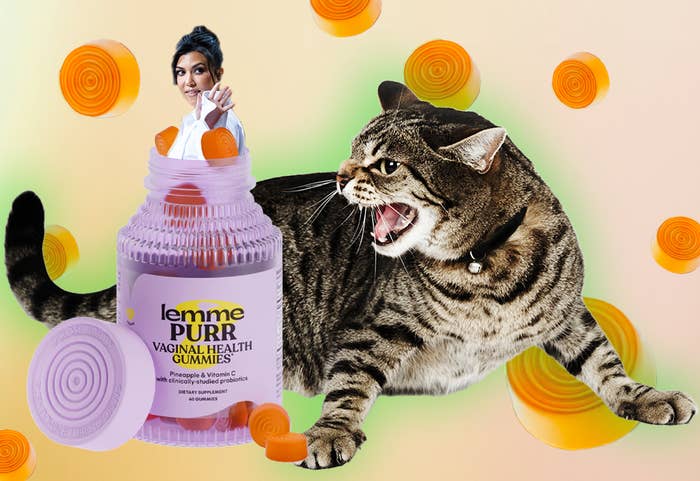
At $30 a bottle, Kourtney Kardashian’s new vagina gummies promise to turn your [pussy cat emoji] “into a sweet treat,” helping it smell and taste better while supporting vaginal health, pH levels, and “freshness.”
“You know what they say… you are what you eat,” one of Kardashian’s Instagram posts says about the vitamins, which were released last week.
As good as the intentions may be, however, gynecologists across the country are cringing at the message: The reality TV star’s newest line of botanical supplements seems to suggest that your vagina and its natural tang need to be fixed.
“I like that we are bringing attention to vaginal health but this idea that your vagina is dirty and should smell like a flower or taste like a bakery is ridiculous,” Dr. Carolyn Moyers, an OB-GYN in Texas and CEO of Sky Women’s Health, told BuzzFeed News. “The vagina is actually self-cleaning. This distorts our body images and makes women feel something is wrong with them; it perpetuates this idea that we are broken and need to fix our body to be appealing.
“I mean, do we talk about penises like this?” she said.
Kardashian’s Lemme wellness line is certainly not the first company to try and monetize the myth that vaginas need to taste like candy. But her lavish following concerns doctors who fear people may ditch real health advice and use this product in lieu of appropriate antibiotics or other treatments if they really do have an issue with their vaginal health.
"The broad availability of products that claim to ‘balance vaginal pH’ or have natural ingredients does not change the biological fact that the vagina does not require ‘balancing,’” Dr. Jennifer Villavicencio, an OB-GYN, told BuzzFeed News in an email.
Not to mention some experts have pointed out that the gummies are inherently anti-feminist.
“Kardashian is uninformed about vaginal health and she is just a common variety misogynist hoping to cash in on false fears created by the patriarchy,” Dr. Jen Gunter, an OB-GYN and author of The Vagina Bible, told BuzzFeed News.
Dr. Marieme Mbaye, an OB-GYN in New York City, told us: “There is absolutely no medical need for this product … This is just thinly veiled misogyny disguised as ‘female empowerment.’”
The science behind probiotics for vaginal health isn’t strong
Titled “Purr,” the pineapple-flavored vitamins contain “clinically-tested” probiotics called Bacillus coagulans that, according to Lemme’s website, have been shown to “support vaginal health, freshness, and odor.”
But doctors were quick to note that the B. coagulans strain used in the Purr gummies has not been well-researched regarding vaginal health, let alone smell.
“If I was going to discuss probiotics to a patient, which I occasionally do specifically related to a condition called bacterial vaginosis, I certainly wouldn’t recommend this type,” Dr. Anita Mitra, a gynecologist in London, wrote on Instagram. “Unfortunately, probiotics are not a panacea for health. There isn’t any scientific evidence that we all need a probiotic.
“If it ain’t broke, don’t try to fix it,” she added.
As far as clinical studies on the probiotic go, it’s been deemed “possibly effective” for relieving symptoms of constipation and irritable bowel syndrome, according to the National Library of Medicine’s Natural Medicines Comprehensive Database, which states that “there isn’t enough reliable information to say whether it might be helpful” for any other purpose.
In 2019, the FDA determined that the specific probiotic strain was “generally recognized as safe” (GRAS) as an ingredient in infant formula.
Some research indicates that certain probiotics can help people who are prone to recurrent yeast or bladder infections, but Mbaye said the results haven’t been promising — “plus, there are so many strains of bacteria that can be included in probiotics that choosing one that's right for your specific body is essentially a shot in the dark.”
Mbaye also emphasized that supplements of any kind aren’t well-regulated, “so it’s really hard to know if what you’re seeing on the label is actually what you're getting in the bottle.”
The Lemme Purr gummies aren’t FDA-approved, as is the case with all dietary supplements. It’s a company’s responsibility to ensure its products are safe. In the event certain supplements are found to be unsafe, the FDA can step in and ask the companies to meet requirements or take the product off the market.
Pineapple doesn’t make vaginas taste or smell better
Lemme Purr contains 100 milligrams of real pineapple extract.
Most people with a vagina have probably heard of the myth that eating pineapples or drinking pineapple juice can make their vagina taste “better” or “sweeter.”
Intrigued by the idea of a perfumed vagina, people have experimented with their own unscientific “taste tests” after consuming excessive amounts of the fruit and found it made no difference in flavor. Kardashian even competed in a “vajayjay smell off” after eating pineapple with her sister Kim in a 2013 episode of Kourtney and Kim Take Miami.
But the science to back it up just doesn’t exist. Moyers called the pineapple myth “fake news” and Gunter said it just “needs to die.”
“Just think about it, when you eat a lot of fruits (of any kind) do they change the smell of your sweat? No,” Mbaye said. “None of that’s going to make its way to the vagina, so eat pineapples if you like them but not because someone is basically saying something is wrong with your natural body when that's not the case.”
Diet does influence vaginal health to an extent, Moyers said. Eating too many processed foods and those high in sugar can suppress your immune system and kill good bacteria in the vagina, eventually leading to infection.
On the other hand, fermented foods like yogurt and kombucha support a healthy gut microbiome, as well as vaginal pH, Moyers said. (pH is a measurement of how acidic or basic something is. A normal vagina pH level is between 3.8 and 4.5, which is more on the acidic side, but this can vary depending on what stage of life you’re in.)
Some vagina smells can indicate infection
If your vagina ever smells fishy or yeasty (think beer or bread), then you’ll want to visit a doctor. Symptoms like itching, discharge that’s worse after intercourse, burning, and discharge that’s green, yellow, or frothy also warrant a healthcare professional’s review.
Abnormal vaginal odors are most commonly caused by infections like bacterial vaginosis, but a general disruption of the vagina’s pH levels can also lead to urinary tract or yeast infections; that can include inserting things like soaps, scented tampons, or douches (devices to clean the inside of the vagina), or even dirty fingers or toys. Sometimes if you leave a tampon in for too long, you may notice a rotten meat-like odor, which should go away once it’s removed.
Otherwise, certain antibiotics, medical conditions like diabetes, unprotected sex, and menopause can disrupt vaginal pH levels.
Because vaginas clean themselves, no special products are needed to maintain hygiene. Most gynecologists say rinsing the vulva off with water is enough to keep vaginas healthy (unscented soaps are safe too); mild soap for body areas with hair, the inner thighs, and the rectum is all you need.
While Lemme Purr vitamins won’t necessarily hurt you or your vagina, doctors say they just won’t accomplish much.
“What I've always told my patients is that your vagina is going to have a distinctive smell that is your smell and that's normal,” Mbaye said. “As long as that smell is not offensive or overpowering to you, don't fall for these gimmicks and don't let anyone make you feel like something is wrong with you.”
